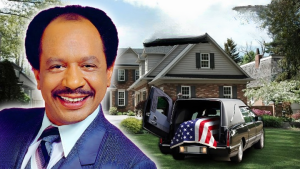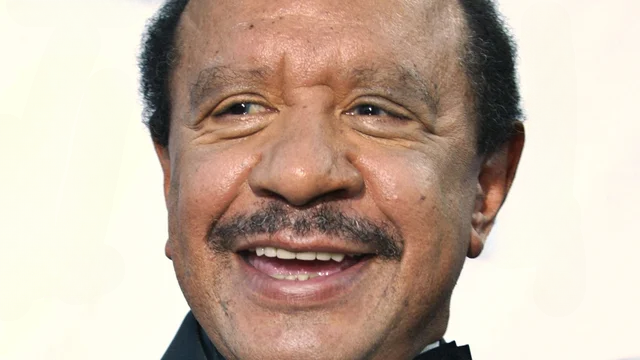On November 21, 2012, Sherman Hemsley, the sitcom legend best known as George Jefferson, was finally laid to rest in El Paso, Texas. His burial, delayed for months due to legal battles, was a quiet affair attended mostly by neighbors and friends. For fans who grew up watching him dominate American television in The Jeffersons, the absence of his former co-stars was striking and raised questions about how Hollywood had remembered—or forgotten—one of its brightest stars.
But the story of Sherman Hemsley’s farewell is about more than who did or didn’t attend his funeral. It is a reflection of a man who lived his life in two worlds: one as the loud, confident George Jefferson, and the other as a deeply private individual who preferred solitude. It is also a story of humble beginnings, groundbreaking success, legal drama, and unanswered questions that linger even after his passing.
From Philadelphia Roots to National Fame
Sherman Alexander Hemsley was born on February 1, 1938, in Philadelphia, Pennsylvania. Raised by a single mother who worked tirelessly in a factory, Sherman grew up with modest means and without the steady presence of a father.
After high school, Hemsley enlisted in the United States Air Force, serving four years before returning to civilian life. He later took a stable job at the U.S. Postal Service. On the surface, he seemed destined for a quiet, ordinary life. Yet, behind the scenes, Sherman nurtured a dream that would eventually change his destiny.
In the evenings, after finishing his postal shifts, he studied drama at the Academy of Dramatic Arts in Philadelphia. Soon, he was performing in off-Broadway productions, living a double life: disciplined government worker by day, ambitious stage actor by night.
This dedication paid off when he caught the attention of Norman Lear, the visionary television producer who would reshape American sitcoms.
George Jefferson: A Character That Made History
In 1971, Hemsley was cast as George Jefferson in All in the Family. George, the brash neighbor of Archie Bunker, was unapologetically proud, outspoken, and ambitious. He quickly became a fan favorite, sparking enough popularity to inspire a spinoff.
By 1975, CBS launched The Jeffersons, with Sherman Hemsley in the lead role. The show ran for an extraordinary 11 seasons and produced 253 episodes, making it one of the longest-running sitcoms in television history.
The impact of The Jeffersons cannot be overstated. It was one of the first American sitcoms to feature an upwardly mobile Black family as the central characters, moving “on up” from Queens to a Manhattan high-rise. The show addressed social issues, poked fun at cultural differences, and presented audiences with multi-dimensional characters.
George Jefferson, with his quick wit and fiery personality, became iconic. For millions of viewers, Sherman Hemsley was George, and George was Sherman. Yet offscreen, the man behind the role was remarkably different.

A Quiet and Private Life
Unlike his on-screen persona, Sherman Hemsley shunned Hollywood’s spotlight. He rarely attended celebrity parties, avoided most interviews, and declined many cast reunions. After The Jeffersons ended in 1985, he went on to star in Amen (1986–1991) and later voiced Earl Sinclair’s boss in the hit series Dinosaurs.
But even as he remained active in the industry, Sherman cultivated a reclusive lifestyle. He loved music, especially jazz, and was known to spend hours listening to records. He lived modestly, surrounded by pets and a close circle of trusted friends.
Hemsley’s colleagues often described him as kind but reserved—someone who kept his personal life guarded. He never married publicly, never had children, and rarely discussed his relationships. This secrecy fueled speculation, but it also reinforced the idea that Sherman valued privacy above all else.
Illness and Passing
On July 24, 2012, Sherman Hemsley passed away in El Paso, Texas, at the age of 74. The cause was complications related to lung cancer. In his final years, he lived in a modest home with longtime companion Flora Enchinton Bernal, who served as his close friend, caretaker, and manager.
What might have been a straightforward farewell quickly turned complicated. Within days of his passing, a will surfaced leaving his entire estate—valued at about $50,000—to Flora. The document had been signed only weeks earlier, raising questions about its validity.
Soon, Richard Thornton, a man from Philadelphia claiming to be Sherman’s half-brother, contested the will. Thornton sought recognition as next of kin and argued that Sherman’s remains should be returned to Philadelphia. This sparked a lengthy and highly publicized legal dispute.
The Legal Battle That Delayed His Funeral
For nearly four months, Sherman Hemsley’s body remained in a morgue as courts debated his final wishes. The conflict captured national headlines, with stories describing how the beloved actor’s funeral had been put on hold by paperwork and disputes.
DNA testing was ordered, and lawyers battled over whether the will had been properly executed. Flora maintained that Sherman had trusted her completely, describing her as his chosen family. Thornton insisted he was protecting Sherman’s legacy.
Finally, on November 9, 2012, Judge Patricia Chew ruled that the will was valid. Flora was recognized as the rightful heir. With the legal disputes resolved, plans for Sherman’s burial could move forward.
A Quiet Ceremony at Fort Bliss
On November 21, 2012, Sherman Hemsley was laid to rest with full military honors at Fort Bliss National Cemetery in El Paso. About 150 people attended the service, including local friends, neighbors, and admirers.
But for many fans, the most noticeable absence was the cast of The Jeffersons. The tight-knit TV family that had once shared living rooms across America was not present at the graveside.
This absence fueled tabloid speculation. Was there bad blood among the cast? Had Hollywood forgotten one of its brightest stars?
The truth was far more nuanced.
Why The Jeffersons Cast Was Missing
By 2012, many of Sherman’s co-stars from The Jeffersons had already passed away.
-
Isabel Sanford (Louise “Weezy” Jefferson) died in 2004 at the age of 86.
-
Roxie Roker (Helen Willis), remembered as part of television’s first interracial couple, passed away in 1995.
-
Franklin Cover (Tom Willis) died in 2006 at age 77.
-
Mike Evans (Lionel Jefferson), who also co-created Good Times, passed in 2006.
For those still living, the four-month delay created insurmountable challenges. Marla Gibbs, who played Florence Johnston—the witty maid who sparred endlessly with George Jefferson—was in her 80s at the time. Traveling across the country on short notice was simply too difficult.
In later interviews, Gibbs dispelled rumors of estrangement. “I miss Sherman so much,” she said. “We even talked about bringing the show back. No one could ever replace him.” Her words silenced suggestions of bad blood and highlighted the realities of time, age, and circumstance.
Sherman Hemsley’s Mystique
Part of what fueled speculation about Hemsley’s funeral was the aura of mystery he carried throughout his life. He rarely opened up about personal matters, and this silence left space for rumors.
Some wondered about his relationships, others about his reclusive habits. His will, which named Flora Enchinton Bernal as his sole heir and “beloved partner,” added another layer of curiosity. Yet, those closest to him insist that Sherman lived life on his own terms—choosing privacy and simplicity over public spectacle.
Legacy Beyond the Rumors
Ultimately, Sherman Hemsley’s legacy cannot be measured by the number of attendees at his funeral. It is defined by the groundbreaking roles he played, the laughter he brought to millions, and the cultural barriers he helped break down.
The Jeffersons was more than entertainment; it was a social statement. At a time when television often relegated Black characters to secondary roles, Sherman Hemsley commanded center stage. His portrayal of George Jefferson was unapologetic, flawed, ambitious, and deeply human.
Through George, Sherman Hemsley helped reframe how audiences saw Black families on television—not as stereotypes, but as complex individuals navigating ambition, family, and society.
Even after The Jeffersons ended, Sherman continued to contribute to the entertainment world through roles in Amen, Dinosaurs, and guest appearances that kept his wit alive for new generations.
Conclusion: Remembering the Man Behind the Legend
Sherman Hemsley’s farewell was quieter than fans may have expected, but his cultural impact remains loud and undeniable. His journey from a Philadelphia postman to one of television’s most iconic characters is a testament to perseverance, talent, and vision.
Though his funeral was delayed by legal battles and marked by the absence of co-stars, it reflected the life he chose to live: private, understated, and away from the spotlight.
Hemsley once said in an interview that all he ever wanted was to entertain people and make them laugh. That mission was more than accomplished. Decades after The Jeffersons ended, George Jefferson’s strut, wit, and confidence remain etched into America’s cultural memory.
Sherman Hemsley may have lived quietly, but his work ensured he will never be forgotten.
